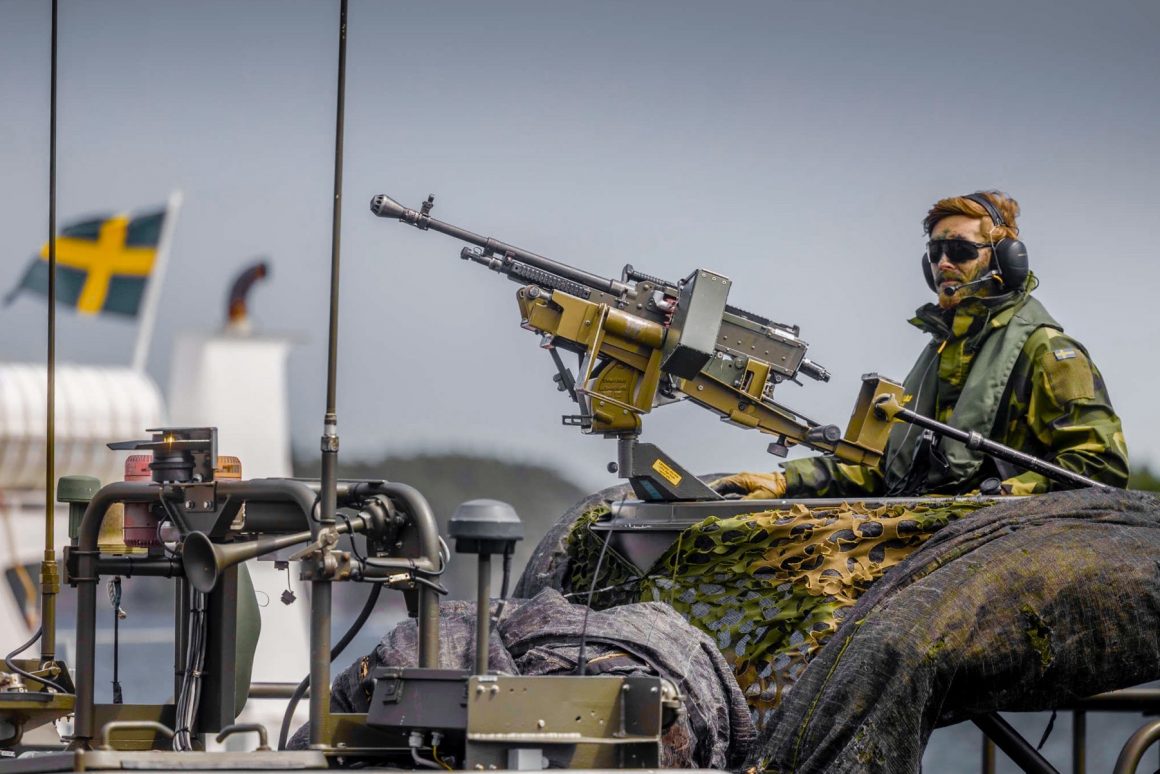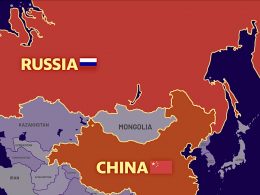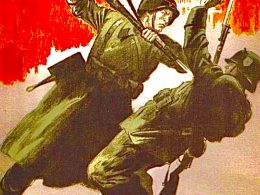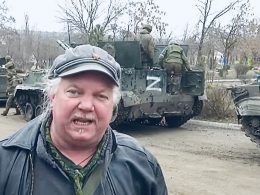When you understand the processes of class struggle, you see that the supposed benefits the Russia-Ukraine conflict has brought to NATO and to American hegemony—wherein NATO has been expanded while Washington’s dominance over Europe has been fortified—don’t mean international capital has achieved a victory. These events instead mean international capital has made itself better able to undermine its own interests; to nurture the historical dynamics that accelerate the falling of the rate of profits, the crisis of overproduction, and the class conflict that comes from these phenomena.
Why is it important to spread awareness about this true nature of the effect the war has had? Because those on the side of international capital seek to obscure it, to convince us that Russia unintentionally aided the U.S. empire by deciding to take action in Ukraine. They want to put forth an alternate version of history, where U.S. hegemony has been overall fortified as a consequence of Russia’s defiance of Washington; which is a version of history where the policies these imperialist agents support, whether neoconservative foreign policy or ultra-leftist opposition towards multipolarity, have been vindicated. The new cold warriors, and the ultra-lefts who in practice align with them, focus on one component of world affairs and try to use it as proof that their side has won. Look, they say, pointing to how they’ve taken one of their opponent’s knights in a chess game; I’ve triumphed over you, you’re finished! Yet while they celebrate, they can’t see how their decision to get this momentary victory has made their king able to be taken out.
The side of multipolarity has won this round on the geopolitical chessboard because the “strengthening” of NATO, and the greater militarization this has brought to Europe, have sped up the process through which the rule of the European (and by extension American) bourgeoisie becomes untenable. When Sweden and Finland became assimilated into NATO, and the rest of the European countries increased their arms spending, they doomed themselves to the same self-inflicted collapse that Stalin foresaw would come for the imperial powers. He described this collapse as the outcome of:
…the contradiction among the various financial groups and imperialist Powers in their struggle for sources of raw materials, for foreign territory. Imperialism is the export of capital to the sources of raw materials, the frenzied struggle for monopolist possession of these sources, the struggle for a re-division of the already divided world, a struggle waged with particular fury by new financial groups and Powers seeking a “place in the sun” against the old groups and Powers, which cling tenaciously to what they have seized. This frenzied struggle among the various groups of capitalists is notable in that it includes as an inevitable element imperialist wars, wars for the annexation of foreign territory. This circumstance, in its turn, is notable in that it leads to the mutual weakening of the imperialists, to the weakening of the position of capitalism in general, to the acceleration of the advent of the proletarian revolution and to the practical necessity of this revolution.
The new cold warriors and the ultras want us to believe it’s a trivial detail that Sweden and Finland have been undergoing economic crises since joining the war effort; and that the inflationary and energy catastrophes which wider Europe and the USA have been experiencing don’t matter either. They expect us to believe the reassurances of the European leaders who flippantly say the living standard crisis the war has exacerbated can simply be solved through social programs; a claim that was disproven many months ago, when these “social programs” (which exist in the context of overall expanding austerity) failed to end the people’s intensifying misery. You can’t heal a terminal illness, especially when you’re doing something that actively accelerates the damage the illness causes. The NATO countries can’t achieve internal stability as long as they remain NATO countries.
This advancement of the class struggle which this conflict has caused applies both to the NATO members, and to Russia; the Russian government’s decision to carry out the special operation represented an increase in the influence of the country’s communists, who had helped pressure Putin into defying the hegemon. And with last month’s PMC rebellion, the bourgeois state has come to feel a greater sense of popular scrutiny regarding its willingness to do what’s necessary for winning the war. Given how economically strong Russia has proven to be amid the sanctions, the outcome of these events won’t be the collapse of Russia, but the advancement of an ideological and political struggle between the capitalists and the communists; a struggle which has already made Ukraine’s victory a mathematical impossibility, and is producing greater hope for Soviet restoration.
Contrast this with the situation within the imperialist countries, and within the reactionary-controlled former Soviet states that have joined the war against Russia. In these places, economic growth and living standards have been declining in a way that both furthers class contradictions, and brings society towards collapse. There’s a reason why the big civil disruption that came about in Russia due to the war, which wasn’t even a popular uprising but a betrayal by one rogue capitalist, could be neutralized so easily: unlike in the NATO countries, in Russia the people are unified behind their government’s war effort. Most Russians see whatever costs from the war as worthwhile, as these are the costs of defeating Ukrainian Nazism and U.S. hegemony.
Yet in the countries waging war against Russia, a growing amount of the people are skeptical of the military investments of their governments, because fundamentally their own material interests do not align with the interests of those orchestrating the new cold war. The American and European workers are purely disadvantaged by the war, whereas the Russian workers at least know that what their government is doing is necessary for defeating the menace to the west. This is why when the war has furthered unrest within the anti-Russian countries, like France, the people are the ones who’ve driven the disruption, and the instability hasn’t been manageable.
The new cold war can only end with Russia at the least being strengthened in its geopolitical standing, if not returned to its Soviet form; as well as with the countries that have joined the effort to destroy Russia being at the least greatly weakened economically and geopolitically, potentially bringing them towards workers revolution. Whether the workers movement prevails within these countries depends on how effectively we combat U.S. hegemony, which at this stage in the class struggle represents the primary obstacle towards proletarian victory in the empire’s core. And we can’t be a serious challenge towards U.S. hegemony if we operate according to NATO’s narratives.
We can’t end NATO’s dominance over the discourse—which is what the hegemon depends on to keep its war operations tenable—as long as we accept NATO’s accounts of how this conflict is going. This is what the ultras do: in order to advance their short-sighted goal of discrediting the “campists,” or the “Russian chauvinists,” or whatever name they call those who are pro-multipolarity, they turn to Washington’s propagandists to inform their views of global events. They exclusively talk about the ways Russia’s economy has been harmed since the dissolution of the Soviet Union; which can be a good way to expose capitalism’s deficiencies, except for when somebody uses this piece of the truth to reinforce NATO’s narrative that the sanctions have been successful at crushing Russia. The ways capitalist restoration has held Russia back aren’t the whole truth; to act like they are is to disregard the progress the Russian people have made since Washington placed them under the rule of a client state in the 90s.
The rise in Russian living standards that’s occurred amid the country’s refusal to continue existing as a client state; the Russian economy’s ability to keep growing while under maximal sanctions; the strength of Russia’s state-owned war industry and increasingly nationalized broader economic structure; these things represent victories within the country’s anti-imperialist struggle. They represent measures that Russia has implemented to be able to survive whatever attacks Washington directs towards it, and to make Ukrainian fascism’s victory unattainable. They’re why events aren’t matching with the account that international capital’s lackeys put forth, where Russia is inevitably headed towards defeat and history is getting reset to Washington’s time of triumph three decades ago.
The reality is that as the imperialist countries fall apart, Russia is on the trajectory towards becoming one of the 21st century’s biggest shapers of global power. Which means China, with the guarantee of being able to keep receiving Russia’s assistance, will become an even more influential player. These countries have already grown more powerful due to the special operation; they’ve been gaining further opportunities to expand the Belt and Road Initiative, and to challenge the U.S. dollar. This has happened because the vast majority of the world’s countries have refused to obey Washington’s command to shun Russia, and joined with the effort to build a better global order.
For this reason, in terms of sheer global scale the forces of multipolarity have benefited more from the special operation than have the forces of empire. And even by the criteria that NATO’s defenders use to judge which side is winning, wherein they solely focus on what’s been happening within the minority of countries that side with Washington, a historical materialist analysis shows Washington to be undermining its own interests. The expanded militarism that the USA and its allies have adopted can, in the long term, only imperil their capitalist ruling classes.
————————————————————————
If you appreciate my work, I hope you become a one-time or regular donor to my Patreon account. Like most of us, I’m feeling the economic pressures amid late-stage capitalism, and I need money to keep fighting for a new system that works for all of us. Go to my Patreon here.
To keep this platform effective amid the censorship against dissenting voices, join my Telegram channel








